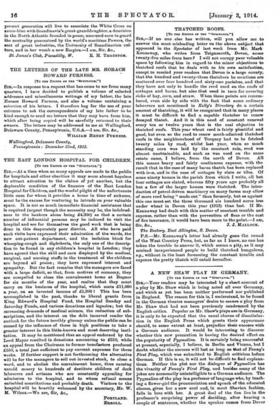TakkoHND ROOM
(To Tar Dimon or Tea ••-srreraror."
131n,—I1 no one else has written, will you allow me to answer the most misleading letter on the above subject that appeared in the Spectator of last week from Mr. Mark Kennaway, who writes from Teignmonth. Devon, some twenty-five miles from here P I will not occupy your valuable space by following him in regard to the minor objections to thatched roofs that he deals with to his own satisfaction, except to remind your readers that Devon is a large county, that the hundred and twenty-three thatchers he mentions are scattered over four hundred and sixty-one parishes, and that they have not only to handle the reed used en the roofe-of cottages and barns. but also that used in turn for covering ricks of hay, corn, and straw. When these paints are remem- bered, even side by side with the fact that some ordinary labourers not mentioned in Kelly's Directory do a certain amount of thatching, it will be recognized that in many places it must be difficult to find a capable thatcher to renew decayed thatch. And it is this need of constant renewal every ten or twelve years that is the real objection to thatched roofs. This year wheat reed is fairly plentiful and good, but even so the reed to renew much-admired thatched roofs in the neighbourhood of Torquay had to be fetched twenty miles by road, whilst last year, when so much standing corn was laid by the constant rain, reed was almost unobtainable, and such as was used on the same estate came, I believe, from the north of Devon. All this means heavy and fairly continuous expense, with the result that in the case of many barns thatch has been replaced with iron, and in the case of cottages by slate or tiles. Of some ninety houses in the parish from which I write, all but four cottages are slated, whereas fifty years ago probably all but a few of the larger bosses were thatched. The intro- duction of petrol-driven machinery on many farms may allow of more reed being "made out' than formerly, but as against this one must set the three thousand six hundred acres less under wheat in Devon this year (1918) than last. If Mr. Kennaway had dealt with this matter of constant trouble and expense, rather than with the prevention of fleas or the cost of fire insurance, it would have been more to the point.—I am,
Sir, &e., J. J. Hammes. The Rectory, Rest Allington, S. Devon.
P.8.—Mr. Kennaway's letter had already gone the round of the West Country Press, but, as far as I know, no one has taken the trouble to answer it, which seems a pity, as it may mislead inexperienced people to build thatched bungalows, e.g., without in the least foreseeing the constant trouble and expense the pretty thatch will entail hereafter.


















































 Previous page
Previous page